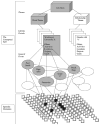The mechanisms underlying overgeneral autobiographical memory: an evaluative review of evidence for the CaR-FA-X model
- PMID: 22142837
- PMCID: PMC3246105
- DOI: 10.1016/j.cpr.2011.10.003
The mechanisms underlying overgeneral autobiographical memory: an evaluative review of evidence for the CaR-FA-X model
Abstract
Overgeneral autobiographical memory (OGM) has been found to be an important cognitive phenomenon with respect to depression and trauma-related psychopathology (e.g., posttraumatic stress disorder), and researchers have been interested in better understanding the factors that contribute to this proposed vulnerability factor. The most prominent model of mechanisms underlying OGM to date is Williams et al.'s (2007) CaR-FA-X model. This model proposes that three processes influence OGM: capture and rumination, functional avoidance, and impaired executive control. The author reviews the current state of support for the CaR-FA-X model by evaluating 38 studies that have examined OGM and one or more mechanisms of the model. Collectively, these studies reveal robust support for associations between OGM and both rumination and impaired executive control. OGM also appears to be a cognitive avoidance strategy, and there is evidence that avoiding the retrieval of specific memories reduces distress after an aversive event, at least in the short term. Important issues that have been left unresolved are highlighted, including the nature of the capture phenomenon, the role of trauma in functional avoidance, and the developmental nature of functional avoidance. Recommendations for future research that will enhance understanding of the factors that contribute to OGM are suggested.
Copyright © 2011 Elsevier Ltd. All rights reserved.
Figures


Similar articles
-
Overgeneral autobiographical memory in healthy young and older adults: Differential age effects on components of the capture and rumination, functional avoidance, and impaired executive control (CaRFAX) model.Psychol Aging. 2017 Aug;32(5):447-459. doi: 10.1037/pag0000175. Epub 2017 Jun 8. Psychol Aging. 2017. PMID: 28594191
-
A test of the CaR-FA-X mechanisms and depression in adolescents.Memory. 2019 Apr;27(4):455-464. doi: 10.1080/09658211.2018.1518457. Epub 2018 Sep 5. Memory. 2019. PMID: 30182812
-
A narrative synthesis of the applicability of the CaR-FA-X model in child and adolescent populations: a systematic review.Memory. 2017 Oct;25(9):1161-1190. doi: 10.1080/09658211.2016.1275699. Epub 2017 Mar 13. Memory. 2017. PMID: 28287902
-
Overgeneral autobiographical memory and depression in older adults: a systematic review.Aging Ment Health. 2018 May;22(5):575-586. doi: 10.1080/13607863.2017.1326461. Epub 2017 May 25. Aging Ment Health. 2018. PMID: 28541754
-
A prospective investigation of rumination and executive control in predicting overgeneral autobiographical memory in adolescence.Mem Cognit. 2018 Apr;46(3):482-496. doi: 10.3758/s13421-017-0779-z. Mem Cognit. 2018. PMID: 29340943 Free PMC article.
Cited by
-
Knowledge of Chosen Family History and Depressive Symptoms in Sexual Minority Women.Front Psychol. 2021 Jun 15;12:624641. doi: 10.3389/fpsyg.2021.624641. eCollection 2021. Front Psychol. 2021. PMID: 34211416 Free PMC article.
-
Neuropsychological Predictors of Trauma Centrality in OIF/OEF Veterans.Front Psychol. 2017 Jun 30;8:1120. doi: 10.3389/fpsyg.2017.01120. eCollection 2017. Front Psychol. 2017. PMID: 28713319 Free PMC article.
-
Research Review: Why do prospective and retrospective measures of maltreatment differ? A narrative review.J Child Psychol Psychiatry. 2024 Dec;65(12):1662-1677. doi: 10.1111/jcpp.14048. Epub 2024 Aug 16. J Child Psychol Psychiatry. 2024. PMID: 39150090 Free PMC article. Review.
-
Reduced specificity of personal goals and explanations for goal attainment in major depression.PLoS One. 2013 May 15;8(5):e64512. doi: 10.1371/journal.pone.0064512. Print 2013. PLoS One. 2013. PMID: 23691238 Free PMC article.
-
Neuroplasticity in cognitive and psychological mechanisms of depression: an integrative model.Mol Psychiatry. 2020 Mar;25(3):530-543. doi: 10.1038/s41380-019-0615-x. Epub 2019 Dec 4. Mol Psychiatry. 2020. PMID: 31801966 Free PMC article. Review.
References
Publication types
MeSH terms
Grants and funding
LinkOut - more resources
Full Text Sources
Miscellaneous

